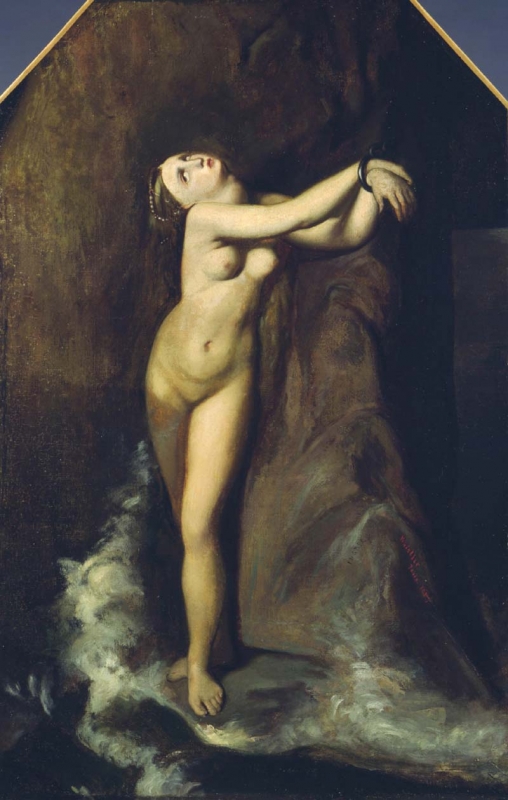Provenance
- 1856/1857: commissioned by an American collector, possibly William Richard ('Dick') Suydam Palmer (1834-1870) .
- 1900/1902: with the William Macbeth Gallery, 233 8th Avenue, New York.
- 1905: with Keppel, New York dealers.
- 1913-1914: exhibited by the Macbeth Gallery, New York, 1913, and returned to Mrs G. E. Janitor (dates unknown) , New York, on 6 October 1914.
- By 1935: sold by the Macbeth Gallery to George L. Nelson (dates unknown) , New York.
- 1960s: bought from a private collector by Ira Spanierman (n/a) , New York dealer;
- 1968: Spanierman exchanged the oil painting with the University of Glasgow for three watercolours by Whistler in May 1968.
The date, sequence and identity of owners is in some doubt. Despite confusing and conflicting records, the known provenance suggests that this painting was commissioned by a Stonington man, possibly William Richard ('Dick') Suydam Palmer (1834-1870) . Whistler's mother, Anna Matilda Whistler (1804-1881), wrote to him in July 1857 that, according to his aunt, Catherine Jane Palmer (1812-1877), 'Dick Palmer', in Union Place, Stonington, 'values the copy you had done for him.' 1 However, although Dick Palmer could well have commissioned the copy after Ingres, or he could equally have commissioned another painting, such as the Copy after Mignard's 'La Vierge à la grappe' [YMSM 012].
Thomas Armstrong (1832-1911) wrote: 'Whistler made copies of portions of ... the nude figure of Angelica chained to the rock in Ingres' picture', and was to be paid 100 francs for the copy, one of four paintings 'a whaling captain' had commissioned. 2 Arthur Jerome Eddy (1859-1920), stated that this was one of three copies of paintings in the Louvre commissioned in Paris by a 'Captain Williams' whom Whistler had originally met at the United States Military Academy at West Point. 3 Certainly Charles Phelps Williams (1804-1879) , a former whaling captain from Stonington (but not West Point) commissioned several paintings, including Copy after Ziegler's 'La Vision de St Luc' [YMSM 015] (which is dated 1858) and Copy after Odier's 'Episode de la retraite de Moscou' [YMSM 017], but there is no evidence that this copy after Ingres was one of them.
Indeed, Whistler himself told his biographers, the Pennells, that when he was first studying in Paris a man from Stonington asked him to paint a copy of 'Ingres' Andromeda chained to the rock', and another Stonington man, 'Captain Williams', commissioned his portrait and four other copies. 4 This also agrees with a note by Charles Lang Freer (1856-1919), who recorded – many years later – that it was 'painted for a gentleman friend of Capt Williams of Stonington, Conn.' 5
Furthermore, although the painting was probably in America in 1857, or at least by 1858, its history thereafter is also confused. At the turn of the century, the painting was in the William Macbeth Gallery in New York; 6 Arthur Jerome Eddy (1859-1920), writing in 1903, said that 'a copy of an Ingres, turned up in New York a year or two ago. It bore Whistler's signature, but was so atrocious ... that even the dealer doubted its authenticity; but when a photograph was shown Whistler, he recognised the picture and told the story.' 7 Cary recorded the painting as with Keppel, (not Macbeth) another New York dealer, who exhibited it as 'Andromeda' in 1905. 8 However, it was certainly exhibited by the Macbeth Gallery in 1913, and their records state that it was 'returned' to one 'Mrs G. E. Janitor', at 49 North 69 Street, New York, on 6 October in the following year. 9 It re-appeared at the Macbeth Gallery, and was sold to George L. Nelson (dates unknown) , New York, some time before 1935, when he is recorded as lending it to an exhibition.
Finally, after another gap, it was bought in the 1960s from a private collector by the New York art dealer Ira Spanierman, who, in May 1968, exchanged the oil painting with the University of Glasgow for several watercolours by Whistler.
Exhibitions
It was not exhibited in Whistler's lifetime.
Notes:
1: A. M. Whistler to J. Whistler, 13-15 July [1857], GUW #06485.
2: Lamont 1912 [more] , pp. 178-79.
3: Eddy 1903 [more] , pp. 79-80.
4: Whistler, on 6 August 1900, quoted in Pennell 1921C [more] , p. 171.
5: [1902], Diaries, Bk 12, Freer Gallery Archives.
6: Macbeth Gallery records, ca 1900, Archives of American Art; C. L. Freer Diaries, [1902], op. cit.
7: Eddy 1903 [more] , pp. 79-80.
9: Macbeth Gallery records, 1913-1914, Archives of American Art.
Last updated: 25th November 2020 by Margaret





